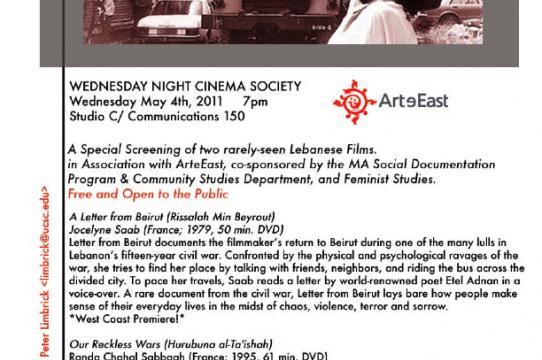Wednesday Night Cinema Society
May 4th, 2011 7pm
Studio C/ 150 Communications
in Association with ArteEast, co-sponsored by the MA in Social Documentation program and Feminist Studies presents a screening of two rarely-seen Lebanese films:
A Letter from Beirut (Rissalah Min Beyrout) Jocelyne Saab (France; 1979, 50 min. DVD)
The Lebanese civil war was long-drawn and interrupted with lulls brokered by truces calling for the cessation of hostilities. At every lull, there was a wonder whether the war had in fact reached an end. Letter from Beirut documents the filmmaker’s return to Beirut during one of the lulls, three years after the outbreak of the civil war. She is confronted by the physical, emotional and psychological ravages of the war, terrified and sorrowful, she cannot find her place in the city. In that quest, she communicates with everyday people, friends, neighbors, people riding the bus across the city’s eastern and western flanks. To pace her journeying and dramatic unraveling of the film, Saab borrows the guise of a letter read in a voice-over, written by world-renowned poet Etel Adnan. A rare document from the civil war, Letter from Beirut lays bare and spontaneously how people make sense of their everyday in the midst of chaos, violence, terror and sorrow. *West Coast Premiere!*.
Our Reckless Wars (Hurubuna al-Ta'ishah) Randa Chahal Sabbagh (France; 1995, 61 min. DVD)
Within a few years of its eruption in 1975, the Lebanese civil war became a battleground for armed militias who sought to establish control over small parcels of territory. The conflict lasted seventeen years. In 1983, Randa Chahal Sabbagh began to film her family and the every day strife that confronted them. She collected the footage and rarely looked at it until the war was over and the country's rehabilitation had begun. She returned to images she had recorded over the years eager to tell a story. It was difficult to weave a coherent narrative of the war, its outcomes, and the impact on her own family– which included feelings of regret and pain. “By staging conversations with my family, I was able to discipline the disorderliness of the city’s sequences,” the filmmaker explained. Resurrecting images of the war, now that it was over and lost, the filmmaker was bidding her farewells to a city that she relentlessly tried to leave. “Is it possible to regret the war?”, she asks.
Selections of this program are curated from “Chronicles of Paradise Lost: Filming Absence (Lebanese Cinema 1965 – 2010)” a touring exhibition organized by ArteEast (www.arteeast.org). Program notes are excerpted from ArteEast’s notes.



